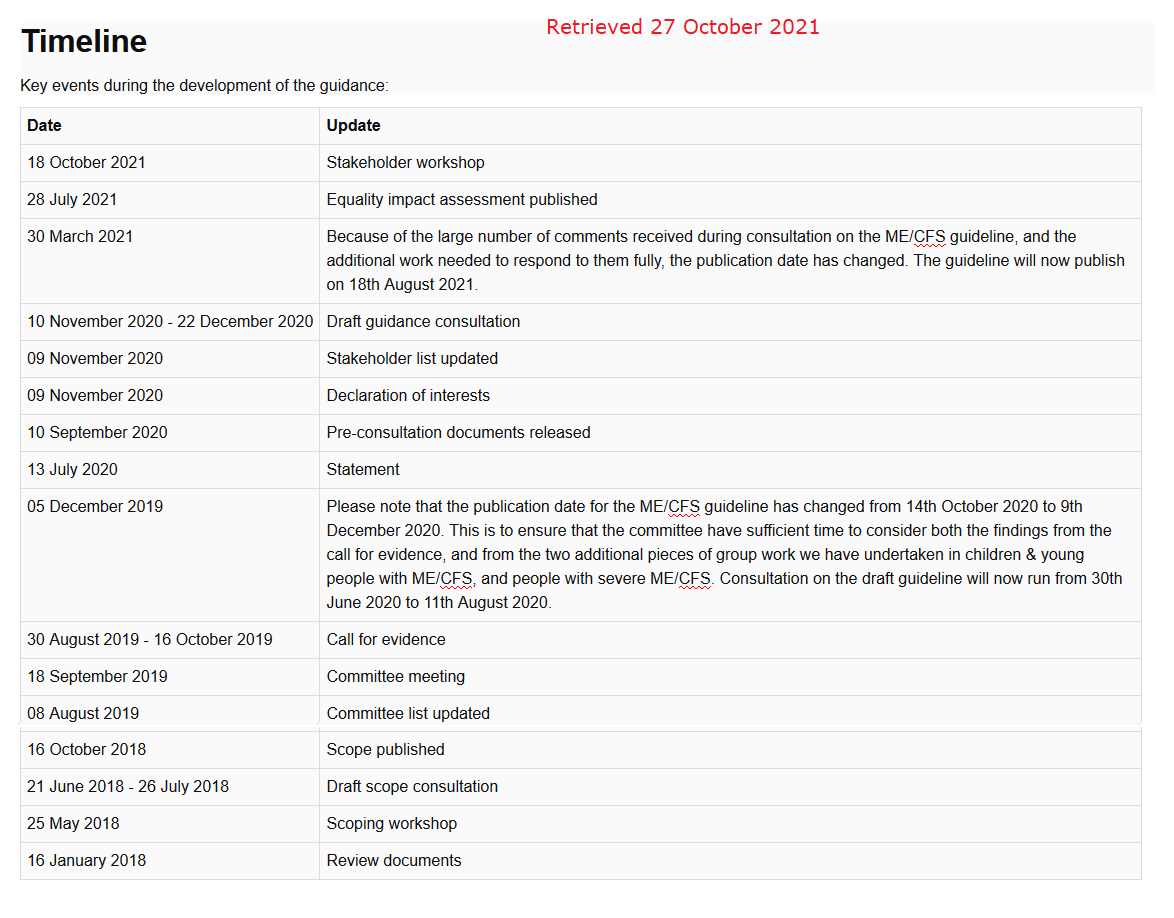Dx Revision Watch
Senior Member (Voting Rights)
Thank you mods and admins for all the work collating links and content for this new thread.
Please move the following if it would be better placed elsewhere:
At 5.58am this morning I received notification from WDTK of a response to my outstanding FOI.
(My bolding)
https://www.whatdotheyknow.com/requ...e_e?nocache=incoming-1905428#incoming-1905428
National Institute for Health and Care Excellence (NICE), National Institute for Health and Care Excellence
29 October 2021
Dear Suzy
Reference: EH-317847
FREEDOM OF INFORMATION ACT 2000
I am sorry for the delay in responding to your request for information.
Please find the response to your questions below:
1. The date on which Quality assurance for guideline: Myalgic
encephalomyelitis (or encephalopathy)/chronic fatigue syndrome:
diagnosis and management In development [GID-NG10091] was signed off.
Response: The guideline was signed off on 08 July 2021.
2. The date on which the NICE Pathway (everything NICE says on a topic in
an interactive flowchart) and any supporting resources were signed off
for quality assurance.
Response: Information not held. A NICE Pathway is an alternative
representation of other NICE guidance, the content is the same. The
content was signed off under 1 and 3.
3. The date on which NICE's Guidance Executive signed off guideline
GID-NG10091.
Response: NICE’s guidance executive approved the guideline for embargoed
release on 30 July 2021.
If you have any questions on this response you are welcome to email the
enquiry handling team at [1][NICE request email].
If you are unhappy with this response and want an internal review of how
we handled your request etc.
-------------------------------------------------------------------------------------------
So there we have it:
Quality assurance signed off on 08 July 2021.
Guidance Executive approved the guideline for embargoed release on 30 July 2021.
I'll add these dates to my unofficial Timeline.
It doesn't look as though the other outstanding requests submitted via WhatDoTheyKnow have been fulfilled yet.
See: https://www.s4me.info/threads/foi-r...lay-publication-of-the-final-guideline.23023/
Status of the overdue requests submitted directly to NICE unknown.
Please move the following if it would be better placed elsewhere:
At 5.58am this morning I received notification from WDTK of a response to my outstanding FOI.
(My bolding)
https://www.whatdotheyknow.com/requ...e_e?nocache=incoming-1905428#incoming-1905428
National Institute for Health and Care Excellence (NICE), National Institute for Health and Care Excellence
29 October 2021
Dear Suzy
Reference: EH-317847
FREEDOM OF INFORMATION ACT 2000
I am sorry for the delay in responding to your request for information.
Please find the response to your questions below:
1. The date on which Quality assurance for guideline: Myalgic
encephalomyelitis (or encephalopathy)/chronic fatigue syndrome:
diagnosis and management In development [GID-NG10091] was signed off.
Response: The guideline was signed off on 08 July 2021.
2. The date on which the NICE Pathway (everything NICE says on a topic in
an interactive flowchart) and any supporting resources were signed off
for quality assurance.
Response: Information not held. A NICE Pathway is an alternative
representation of other NICE guidance, the content is the same. The
content was signed off under 1 and 3.
3. The date on which NICE's Guidance Executive signed off guideline
GID-NG10091.
Response: NICE’s guidance executive approved the guideline for embargoed
release on 30 July 2021.
If you have any questions on this response you are welcome to email the
enquiry handling team at [1][NICE request email].
If you are unhappy with this response and want an internal review of how
we handled your request etc.
-------------------------------------------------------------------------------------------
So there we have it:
Quality assurance signed off on 08 July 2021.
Guidance Executive approved the guideline for embargoed release on 30 July 2021.
I'll add these dates to my unofficial Timeline.
See: https://www.s4me.info/threads/foi-r...lay-publication-of-the-final-guideline.23023/
Status of the overdue requests submitted directly to NICE unknown.
Last edited:

